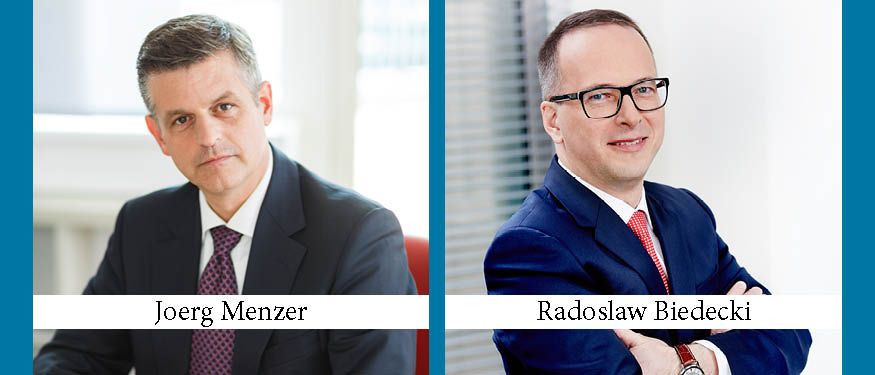CEE Legal Matters reported in November that a team of 11 lawyers from Polish firm DJBW will join Noerr’s Warsaw office effective January 1, 2017. Of the five Partners in DJBW, four – Witold Danilowicz, Witold Jurcewicz, Radoslaw Biedecki, and Ludomir Biedecki – will move to Noerr. CEE Legal Matters reached out to both Joerg Menzer, Regional Managing Partner of Noerr’s CEE offices in Bratislava, Bucharest, Budapest, Prague, and Warsaw, and Radoslaw Biedecki, who will become the new Office Head of Noerr in Warsaw, to learn more about the move and what led to it.
CEELM: The natural question is why this onboarding made sense for both Noerr and DJBW.
J.M.: The main idea for us is that we’ve always aimed to be a strong player in the region. We feel we’ve achieved that in CEE as a whole and to some extent within each national market individually – but I think, in many ways, we are somewhat seen as a hidden champion. We work with many major clients – including Daimler and Kaufland, among others – who don’t really allow us to talk about the deals we work on. Maybe we just take such client requests more seriously than others, or maybe it’s the nature of the clients we work with, but, at the end of the day, it means that we are not as visible at times as we would like to be.
Looking at Poland specifically, while we felt we were well positioned there, we also felt that we were not embedded enough in the national market, and therefore we were keen to build ourselves up into genuine local champions. Because we’ve been heavily transactional-focused, the size of the team was limited, which generally is fine – we never wanted to build a huge team – but it was obvious to us that the market was moving and that we needed to move with it. We hired strategic consultants who analyzed the legal market with us. Initially, the DJBW team was presented to us on an anonymous basis following their research and we felt it was a great match.
CEELM: Which consultancy did you use for the project?
J.M.: We used Venturis Consulting Group International – a team that I was already familiar with as they are also members of the Law Firm Management Committee within the IBA. We preferred to work with them over an executive search firm because we felt we needed people who truly understood the business environment and the legal sector as well as practice management challenges when it comes to such a move – it was clear to us this was not going to be a simple recruitment exercise.
CEELM: What about DJBW? What were the main reasons for your move?
R.B.: We had been thinking for a while now that a firm of 30-40 lawyers is exactly what the market needed – that size would allow for both day-to-day work and some big-ticket-deal executions. Growing to that size organically would have taken a long time. We weren’t necessarily thinking of tying up with a German firm, simply because they tend to have a low profile in the country – indeed, German firms are known more for leaving the market than for coming in. (Laughs)
Considering the economy of Poland, this makes sense, though. We have a lot of connections in the German market and we have received some nice referrals over time. Joining forces with Noerr in this setting simply made a lot of sense.
CEELM: Was losing potential referral work a concern?
R.B.: Naturally, that was part of the consideration. The pipeline was openly discussed among us, and of course we were aware that we will probably lose the connections with other firms in Germany. But on balance, we hope to be able to compensate with work from Germany, and indeed from across the region, within Noerr.
J.M.: It is also worth pointing out that some of our best-friends’ relationships also overlapped.
But looking at the business case beyond that, we knew that we needed to cater to the Polish champions and blue chips, and we were realistic in recognizing that we did not have a lot of exposure to them. The DJBW team would offer that exposure, while growing in size to be able to cater to them better. At the same time, economic ties between Poland and Germany, as already mentioned, are significant by any measure and seem to grow every year. Being fully embedded into the local market would allow us to tap into that potential even more.
CEELM: How large is the team now?
J.M.: Together we are 40 people now. From a practice group perspective, we had little overlap, which is great because it means little friction while allowing us to add a number of complementary practices. We’re keen to be able to look at Venture Capitalists, IPOs, Private Equity, Mergers & Acquisitions, and Fintech, along with some capabilities in litigation, which we’ll likely expand, along with Pharma and IT.
From a seniority perspective things worked out great as well. We were Partner-driven with a higher leverage and good Junior Associates. The new team comes in with a lot of strong Senior Associates.
CEELM: Blending mentalities and organizational cultures are usually the big challenges when it comes to team mergers. How do you expect these to play out for you?
R.B.: That’s certainly a challenge, as it is in most such instances, but I think that played a much smaller part for us. We’re not your typical Polish firm. We are more internationally focused, and we ran our firm in a different way. The fact that we were able to communicate differently, openly, and straight to the point helped in bringing the teams together.
J.M.: Another important aspect is that we don’t buy into the common narrative in CEE: “We are international, therefore I can advise better by default.” We are also not really a German firm – we have 5 offices in Germany, all around CEE, and in Brussels, London, Alicante, and New York, so over one third of our lawyers are not in Germany. This openness is important to us because we are a European firm – we share the same values: excellence, trust, team spirit, and passion for the work we do.
CEELM: Can we expect to see similar moves by Noerr in other CEE markets in the near future?
J.M.: If the appropriate opportunity arises, we will certainly consider it. We always look to strengthen, pending market circumstances. We’re generally conservative enough to say we need to take our time and do these things right. We are not the Dentons type – while we agree at times that pure organic growth is not enough; in many ways, because of the fit between the two firms in this case, it feels organic, as the cultures are very much alike.
At the end of the day we’re not in the numbers game. We aim primarily to grow in efficiency and in terms of the place and position we hold in the market. I could easily say, “Let’s bring in 50 more people,” but we really want to remain focused as a transactional firm. The approach has worked well for us so far and I bet it will continue to do so.
This article was originally published in Issue 3.6 of the CEE Legal Matters Magazine. If you would like to receive a hard copy of the magazine, you can subscribe here.
















